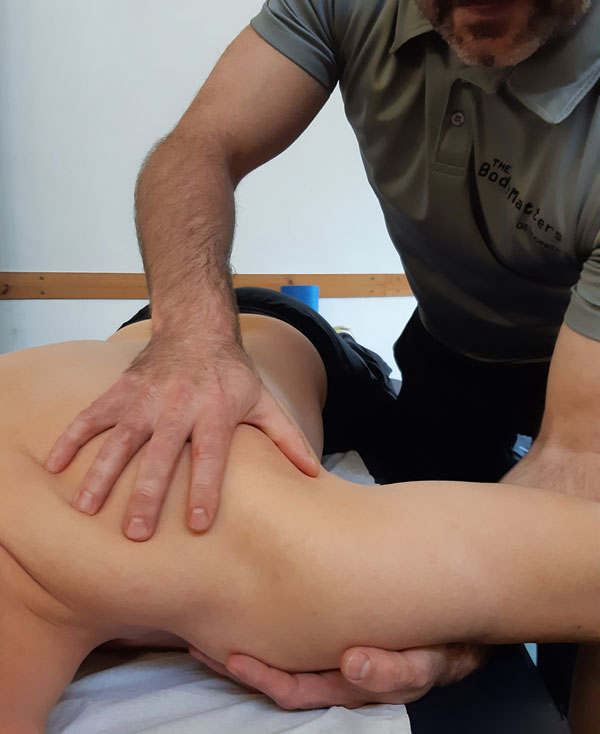
Physiotherapy in Southend-on-Sea for a wide range of conditions at The Body Matters. Physiotherapy treatments are available from our clinic based in Leigh-on-Sea, Essex. We also provide telephone & online support and remote consultations. Call us on 01702 714968 for more information.
What is Physiotherapy?
In physiotherapy, physiotherapists are trained to high standards in order to properly assess and diagnose your condition, treating your issues so that you are able to reach your full potential and carry on maintaining an active lifestyle.
Physiotherapists work in the rehabilitation of musculoskeletal injuries, cardiac respiratory conditions, and neurological issues. The primary ethos of Physiotherapy at The Body Matters is to concentrate on manual therapy treatments such as manipulation, mobilisation, and soft tissue massage, if this is considered to be the safe and correct course of treatment so that the client can leave the clinic feeling better than when they arrived. They will often also use a variety of prescribed exercises that the patient can carry on with at home. As a result, physio treatments will tend to be quite specific.
Physiotherapists are also very likely to use additional therapies such as Acupuncture, Sports strapping tape techniques, and heat and cold therapies to facilitate change in an injured area. This is all aimed at repairing damage, reducing scar tissue, speeding up the healing process, and reducing pain and stiffness.
What to Expect from Physiotherapy at The Body Matters
 During the initial physiotherapy session, you will be assessed to help locate the source of your problem. Once assessed, and the problem has been identified the Chartered Physiotherapist may use any one of a variety of techniques to aid your recovery, thereby helping your muscles and joints work to their full potential.
During the initial physiotherapy session, you will be assessed to help locate the source of your problem. Once assessed, and the problem has been identified the Chartered Physiotherapist may use any one of a variety of techniques to aid your recovery, thereby helping your muscles and joints work to their full potential.
This may also help repair any damage by speeding up the healing process and reducing pain and stiffness. Physiotherapy techniques may include manipulation and mobilisation, massage therapies, hydrotherapy, exercise programs, ultrasound, and sometimes acupuncture.
Identifying the possible factors that have contributed to your problem in the first place is important in attaining your goal of returning to full fitness. These may be such things as poor posture, improper techniques, muscle imbalances, poor working practices, or other unfortunate habits that we tend to fall into in our busy lives. This will help prevent the risk of the same thing happening again in the future.
Setting goals during rehabilitation is key for the client to stay positive and motivated. If there are no solid timeframes it can feel much longer to the client, and therefore demoralising. When the negative feelings begin to linger, so does the will to participate in rehabilitation.
Physiotherapy & Sports Injuries
The Chartered Physiotherapists at The Body Matters know and understand the need and desire for sporting clients to get back to the sport as soon as is appropriate. Therefore we will provide a rehabilitation program, if required and advice on how to prevent a recurrence of the injury.
Whatever your problem it is important that you follow the aftercare advice, exercise, mobility, and stretching advice if given as this will aid your recovery, and help prevent the problem from returning, with lots of encouragement from us!
Physiotherapy can help with the following:
Physiotherapy FAQs
You may need physiotherapy for a wide range of conditions, including sports injuries, back pain, arthritis, post-surgery rehabilitation, neurological disorders, and musculoskeletal problems. Physiotherapy can also be beneficial for preventive care and health maintenance.
Physiotherapists offer a wide range of treatments tailored to individual needs. Common treatments include manual therapy (hands-on techniques), exercise programs, and education on injury prevention and self-care.
There may be some level of discomfort during your physiotherapy treatment, especially if you're recovering from an injury or surgery, but this should be tolerable. Your physiotherapist will be able to explain what to expect.
Yes, physiotherapy can play a preventive role by helping you improve your strength, flexibility, and posture, which can reduce the risk of injury. Physiotherapists can also provide guidance on injury prevention strategies for specific sports or activities.
The duration of a physiotherapy session can vary but typically ranges from 30 minutes to one hour. The length of the session depends on the complexity of the condition and the treatment plan.
The number of sessions required varies depending on the nature and severity of your condition. Your physiotherapist will develop a treatment plan and discuss the expected duration with you.
You should wear loose and comfortable clothing for your physiotherapy session, such as a T-shirt and shorts or a tracksuit. It is important that you are able to move around easily.
If you are paying for your own physiotherapy treatment, you do not need a doctor's referral. However, if you are using private insurance, then you should check your insurer's requirements first. Find out more.
Remote Consultations Available
We continue to use remote consultations to provide our services without physical interaction, if required, by shifting some appointments to video consultations.
Read our Remote Consultations page for more information.
Call 01702 714968 for more information about physiotherapy in Southend-on-Sea & Leigh-on-Sea, Essex at The Body Matters.


